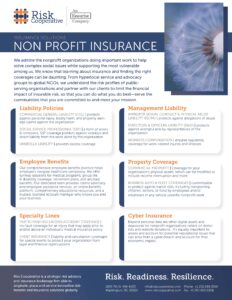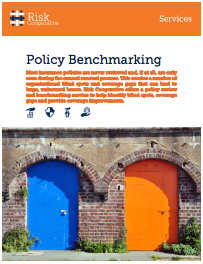Insurance Solutions
Nonprofit Insurance
We admire the nonprofit organizations working to solve complex social issues while supporting the most vulnerable among us. We know that learning about insurance and finding the right coverages can be overwhelming. From hyperlocal service and advocacy groups to global NGOs, we understand the risk profiles of public-serving organizations and can partner with you to limit the financial impact of insurable risk and transfer it away from your organization, so you can do what you do best—focus on your mission.
Key Coverages
Liability Policies
Commercial General Liability (CGL) protects agains personal injury, bodily harm, and property damage claims against the organization
Social Service Professional (SSP) is a form of errors & omissions coverage that protects against vicarious and direct liability from the work done by the organization
Umbrella Liability provides excess coverage beyond the limits of your other policies
Management Liability
Improper Sexual Conduct & Physical Abuse Liability (ISCPA) protects against allegations of abuse
Directors & Officers Liability (D&O) protects against wrongful acts by representatives of the organization
Workers Compensation ensures enough coverage for work-related injuries and illnesses
Employee Benefits
Our comprehensive employee benefits practice helps employers navigate healthcare complexity. We offer turnkey solutions for medical programs, group life & disability coverage, retirement plans and ancillary benefits. Our dedicated team provides claims advocacy and employee assistance services, an online benefits platform, complimentary educational resources, and a trusted, licensed account manager who knows you and your business.
Property Coverage
Commercial Property covers your organization’s physical assets, and can be modified to include income interruption and more
Business Auto & Fleet Coverages are customizable to protect against transit risks, including transporting children, seniors, or food by employees and/or volunteers in a any vehicle used for nonprofit work
Specialty Lines
Participant/Volunteer Accident Coverage is a no-fault coverage for an injury that may apply prior to and/or above an individual’s medical insurance policy
Event Insurance includes liability and cancellation coverages for special events to protect your organization from legal and financial repercussions
Cyber Insurance
Beyond personal data are other digital assets and exposures for nonprofit organizations reliant on donor lists and website donations. It’s equally important is to assess and account for potential reputational issues that can arise from a cyber breach and account for their economic impact.
Resource Library
“A key component of why it’s so critical to integrate the insurance with the MSSP, is because you need to understand what you currently have in place, establishing a baseline, and then opting for coverage. Too many times people don’t know what their situation is, which can lead to litigious claims scenarios or denials down the line,” says Andres Franzetti.
How does insurance fit within your cyber protection strategy?
According to Dan Dickenson, “In servicing the SMB market – from 500 to 50 seats – over the course of many years, we’ve seen a lot of cyber incidents. They are a crime of opportunity, and a crime that has virtually no cost to the criminals who try to attack your security infrastructure.”
While the threat landscape has evolved, what hasn’t changed is the human factor. Almost all attacks involve a person making a mistake, and while good security habits can help, ultimately cyber insurance coverage is needed to protect the business.
“We often tell clients that cyber insurance is an important part of a cybersecurity strategy. Have a conversation with the client, the security team, and the broker to review your policies and ensure your business requirements and your technology are aligned with your coverage. Many times, we find gaps there,” cautions Dan.
While the cyber insurance market has seen wild fluctuations over the past few years, with premium increases and lack of access, it’s now softening slightly as insurers are able to use data to make more calculated risks.
If you have a computer, you have cyber risk. Then, it’s up to you to determine if you have the resources to deal with a cyber-attack on your own, and smaller companies are going to struggle the most. In today’s environment, even mid-sized firms are unlikely to have the resources needed to effectively manage cyber security in-house and almost certainly do not have the resources needed to handle a cyber incident.
“Cyber coverage, a good MSSP, a good IT provider are really necessary for almost any organization today because the complexity is ramping up so much,” Dan argues, and “just like the attack surfaces and technical requirements have really ramped up over the last five years, the business requirement have and will continue to ramp up as business contracts also require attestations of cyber coverage.”
What is cyber insurance?
Many people mistakenly think their cyber risk is covered with the bundled insurance they have in place, and too often they’re not adequately protected. While general liability insurance is meant to address third-party liability (mostly physical harm or property damage – think, slip and fall), and professional liability insurance addresses issues with the service a business is providing to its customers, cyber insurance and cyber liability are very different. These policies come into play when a cyber breach occurs, to cover the damage to the organization as well as potential data related damages to the organization’s customers. “There’s a lot of nuances with cyber coverages and cyber insurance policies out there, so it can be very daunting for the uninitiated,” Andres explains.
Security and privacy liability coverage is the most commonplace cyber insurance policy, which is triggered when a breach takes place and data is compromised. The coverage addresses liability, regulatory compliance requirements, and remedies for impacted individuals. Another coverage is breach response, which includes activities performed by your MSSP or IT providers to get the business back online, which not all policies include.
To complicate matters, cyber policies can also cover proprietary research and IP (multimedia liability), the cost of claims and assessments (privacy regulatory claims coverage), business interruption, reputational harm, and digital asset restoration. For firms that offer technology as a service, Technology Errors & Omissions coverage is a blend of professional liability and cyber.
Andres notes, “There’s no shortage of real-world cyber incidents to look back on, which is why it’s so important to know what the landscape looks like and have the right partners in place.” Sometimes the easiest and least expensive coverage to procure (for example, a general liability with a cyber endorsement) is not going to provide enough coverage to get your business back online if an incident occurs.
It’s a classic example of ‘you get what you pay for.’ Andres recommends the stand-alone products that provide additional third-party coverages and require a more rigorous underwriting. In fact, robust cyber coverage can actually bring in resources and services to address your cyber incident, such public relations crisis communications. Moreover, there are front-end protections like assessments and testing to help firms better position themselves to prevent a breach – as well as better pricing and coverage based on top-tier preparation.
Good cybersecurity is a force multiplier.
Technology capabilities have never been greater, which means increased complexity and more intersections of technologies among day to day business activities. Says Dan, “Every time we’ve engaged with insurance providers around high quality policies, it always yields a greater comfort and greater protection in the organization.”
Cyber insurance can be the forcing function to help organizations take up security recommendations IT providers have been making. But it’s not the end all solution; there will always be limitations and exclusions. Coverage can be triggered or denied based on actions taken or not taken.
Cyber coverage evolves year by year, in what minimum security is required and what is covered based on the accumulation of data about losses from carriers. “The risk as it stands today is not the risk of tomorrow, so carriers are continually looking for additional data and learning from the past. Tougher underwriting is in place to enhance coverage and carrier protection.” Andres
Insurers are doing vulnerability assessments themselves as part of an organization’s cyber insurance application process, and if they find a gap, they could decline to even quote cyber coverage. Then, there’s the underwriting process itself, which has adopted increasingly rigorous security standards for coverage.
Andres says, “Any c-suite is going to contemplate the ROI, and I think insurance and cybersecurity go hand in hand. You can really see the impact of having proper cybersecurity in place, how good practices can lead to those insurance discounts, insurability and greater coverage.”
Conclusion
When the world was jolted awake to the risk of cyber attacks starting in the 90’s, leadership began to grapple with cyber risk and security. Over the past 20 years, more standards and enforcing organizations have come into existence and most industries now have a cyber component to their licensing and operating requirements. “Technology evolution is creating new risks, creating increased premiums, and creating new solutions to help facilitate responses. Being prepared and having integration with your MSSP is so critical to building cyber resiliency.”
VIEW THE WEBINAR RECORDING:
Insuring Your Protection: Why Cyber Insurance is Vital in Today’s Threat Landscape
Whether you need a comprehensive benefits package or general liability coverage, your insurance broker should be a valued partner that inspires trust. A client/broker relationship should identify the organization’s financial and business needs, leading to a strategic approach toward reaching the client’s benchmarks and achieving long-term goals. But finding clear advice about how to choose […]
Whether you need a comprehensive benefits package or general liability coverage, your insurance broker should be a valued partner that inspires trust. A client/broker relationship should identify the organization’s financial and business needs, leading to a strategic approach toward reaching the client’s benchmarks and achieving long-term goals. But finding clear advice about how to choose your broker can be difficult. In this article, we answer some basic questions to help you in your decision.
Q:Why should you use a benefits broker?
A:Benefits brokers provide many advantages in addition to helping a business procure health insurance, including:
Improved Talent Recruitment and Retention | The market for skilled professionals is competitive. In order to leverage your organization’s benefits as driver for employee recruitment and retention, you need your offering to include a robust package of standard and ancillary benefits. Your benefits broker should have a network of strategic partnerships to help further enhance program offerings.
Risk and Cost Mitigation Assistance | A benefits broker can help businesses mitigate risk factors that may increase employer and employee costs, and implement plan designs that are conducive to long-term success for both the employer and the workforce
Education and Guidance | It’s a broker’s role to provide guidance to an organization’s human resources and executive teams, ensuring employers and employees are adequately educated on all benefit offerings.
Alleviate Administrative Burden for Employers | Through support and administrative tools, a broker can reduce the burden placed on employers while increasing employee utilization efficiency, leading to cost saving opportunities for both employers and employees.
Q: Why does selecting a comprehensive brokerage make good business sense?
A:Some brokerages focus exclusively on either employee benefits or business insurance, while others handle both. There are benefits to selecting a comprehensive broker, such as:
Better Managed Total Cost of Risk (TCOR) | When one broker handles benefits and business insurance, risks across business operations are reduced.
Comprehensive Knowledge of Your Business | Using one broker helps streamline operations, especially during difficult times. Situations like COVID-19 affect both employee benefits and workers’ compensation, but a comprehensive broker can help an organization adapt to changing landscapes and mitigate future risks across all lines of coverage.
Strategic Partnership | More business together translates into a closer relationship, and a better defined, more strategic approach toward meeting financial and business benchmarks
Q: What are key differentiators to look for when selecting a broker?
A:Insurance brokers operate in a highly competitive environment to earn and retain customers’ business. The key differentiators they can provide a client are superior service and knowledgeable advice, such as:
A Main Point of Contact | Look for a broker that offers a primary contact that is held accountable for being responsive and thorough with a client and its workforce (as opposed to a customer service line).
Regular, Effective Communication | Too often brokers only reach out to clients during renewal time rather than maintaining an ongoing conversation throughout the year.
Definitive Timelines | Not only should your broker set timelines and adhere to them, they should communicate clear expectations during the implementation process and apply a proactive, strategic approach throughout the renewal process.
Goes Above and Beyond the Fundamentals | You will want a broker who is willing to assist with explanation of benefits throughout the recruitment process, utilizing in-depth analysis and partnerships to negotiate renewal increases. Working with a broker who functions as an extension of the client’s team, and who is committed to offering quality advisory support, helps an organization better manage their insurance expenses and align its risk mitigation strategy to help meet its business objectives.
Q:How can a broker help my organization with regulatory compliance?
A:Employers offering group health insurance face strict deadlines and liability to provide plan disclosures to employees. Failure to adhere to these guidelines may result in substantial penalties. Your comprehensive broker can help you maintain compliance by:
Conducting a Compliance Audit | You audit should be free of charge and:
Evaluate how well an organization adheres to rules and regulations, standards, and codes of conduct by producing an audit score
Outline the potential penalties for out-of-compliance areas
Recommend action items to improve the audit score to mitigate the risk of penalties
Recommending Compliance Experts | Expert partners assist with remaining fully compliant with ERISA standards throughout the year by providing all required documents, communications, notices, and record-keeping for all benefit plans.
Q:How can my organization optimize my broker relationship?
A:The client/broker relationship works best for all parties when it’s viewed as a valued partnership, with clearly articulated expectations. Many frustrations can be avoided when the client and the broker have a common understanding of not just the service that is to be expected, but also the roles of the broker and the insured.
YOU MIGHT ALSO BE INTERESTED IN:
Optimize Your Broker Partnership , Employee Benefits





